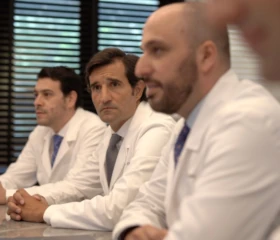Diagnosis Female Urinary Incontinence
With a good clinical history, questionnaires and the support of the following diagnostic tests if necessary, we can reach an accurate diagnosis.
- Super-specialized urologists
- Personalized treatment
- Minimally invasive approach
- More than 16,000 patients successfully treated
Diagnosis
For the diagnosis of female urinary incontinence, the physician should inquire about the timing of urine leakage to detect whether incontinence is predominantly stress incontinence or incontinence due to running to the toilet.
Questionnaires
We have questionnaires and a diary that is given to patients to indicate in which situations they leak urine and in what quantity. This helps us to see the impact of these leaks.
To reliably quantify the amount of urine leaking per day, it is necessary to emphasize that the person is living a normal life. If at the moment when we are quantifying urine leakage, the patient with suspected stress urinary incontinence stops doing her activities for fear of suffering leakage, she may have less leakage than she would have in a normal life, making it very difficult to make an accurate quantification.
Urinalysis with culture
As urinary incontinence is often associated with urinary tract infections, a urinalysis with culture is performed to rule out this very prevalent pathology.
Ultrasound
An ultrasound will be performed to identify that there is nothing basic, such as a stone in the bladder or some kind of alteration in the emptying, since most of them are older people, there may be prolapse of the bladder or uterus, also causing urine leakage.
Urodynamic study
Urodynamic study is not necessary in all patients. This test tells us, subjectively, how the urinary incontinence is and helps a lot to distinguish the type of incontinence.
Normally, the following diagnostic tests are performed to rule out another condition, but with a good medical history and questionnaires we can arrive at an accurate diagnosis.
They ask us in the Consultation
What exercises can I do to strengthen the pelvic floor?
In general, pelvic floor exercises performed with a specialist in pelvic floor physiotherapy are recommended.
How to avoid urinary incontinence during pregnancy?
In general, an active lifestyle, avoidance of excess weight and assessment by a specialist in pelvic floor physiotherapy are recommended.
How do I know if I am starting to develop urinary incontinence?
Basically, if in your day-to-day life, you involuntarily leak urine when you laugh, sneeze or strain.
I am able to hold my urine but I feel the urge to go to the bathroom quickly, is it incontinence?
Most patients with voiding urgency do not have urinary incontinence, but should consult a specialist.
Team of the Female Urinary Incontinence Unit
Newsof ROC Clinic in Female Urinary Incontinence
Research
Diagnostic and therapeutic approach to nocturia in primary care.
Technology
Artificial urinary sphincter implant for severe cases of stress urinary incontinence.


 +34 912 627 104
+34 912 627 104 Contact
Contact













